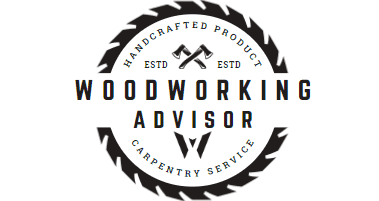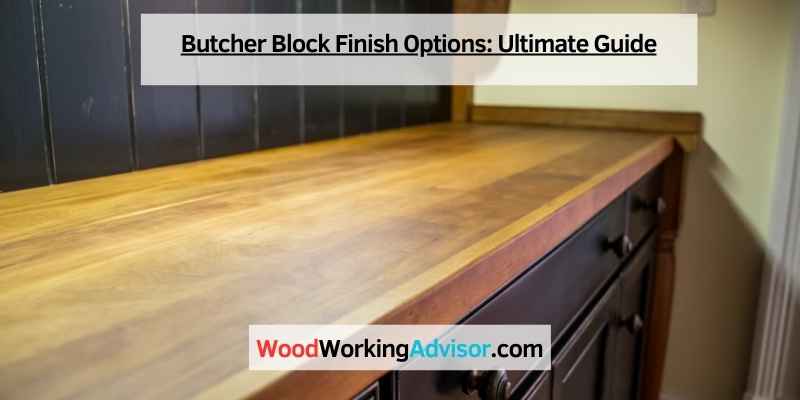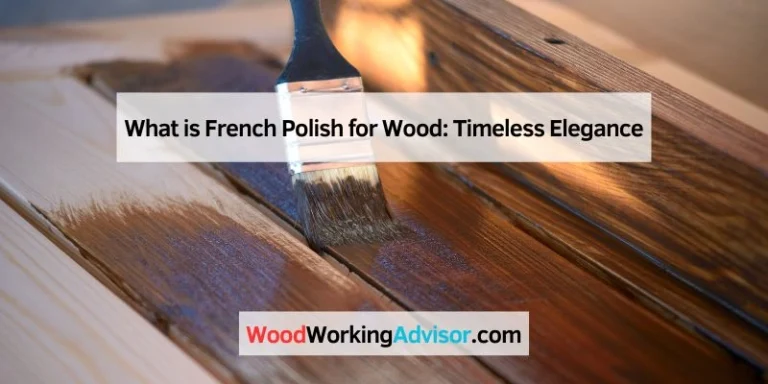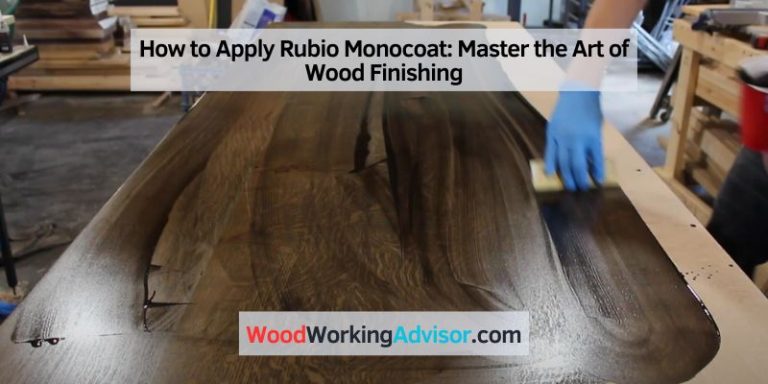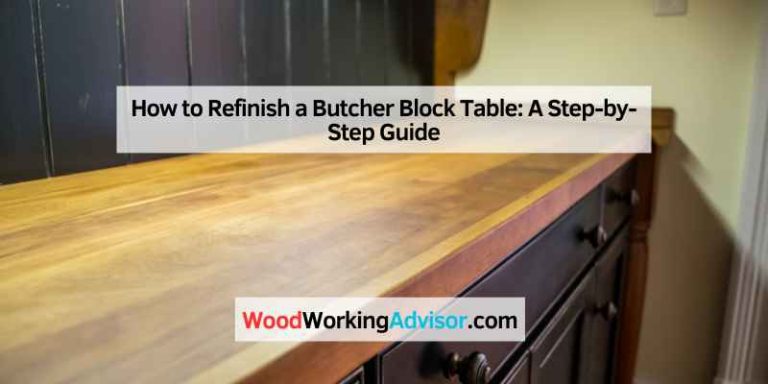Butcher Block Finish Options: Ultimate Guide
Pure tung oil is the best coating for a butcher block, providing a food-safe and durable finish. Lightly sand the surface of the wood and apply the oil using circular motions with a lint-free rag.
We’ll explore different finishing options for butcher block countertops, including the pros and cons of each, and provide tips for maintaining and cleaning them. We’ll also discuss the best wood species for butcher block, as well as the cost and installation process.
Whether you’re a chef or a home cook, a butcher block is a timeless and functional addition to any kitchen.
Pros & Cons Of Butcher Block Countertops
When it comes to butcher block finish options, there are plenty of choices to make. Danish oil and polyurethane are popular choices, but some DIYers prefer tung oil for its durability and less toxic properties. However, butcher block countertops require regular maintenance and sealing to avoid damage.
Butcher block countertops have been around for centuries and are still a popular choice amongst homeowners. They provide a beautiful and functional surface for any kitchen. However, like any other surface material, there are pros and cons to using them in your home.
Best Wood to use for Butcher Block Countertops
When it comes to butcher block countertops, the best wood to use is either hard rock maple or black walnut. These woods are known for their durability, hardness, and resistance to bacteria. Other woods such as cherry, oak, and teak also work well, but they are not as dense as hard rock maple or black walnut.
Cost Comparison: Butcher Block vs Granite or Quartz
One of the significant benefits of using butcher block countertops is their affordability compared to granite or quartz. Butcher block countertops cost about $60 to $100 per square foot, while granite and quartz can cost up to $100 to $250 per square foot. However, keep in mind that the cost will depend on the type of wood and the size of the countertop.
Installation: DIY or Professional
Installing butcher block countertops is relatively easy, and many homeowners choose to install them themselves. However, if you are not comfortable with DIY projects, it might be best to hire a professional to do it for you, as the installation process can be time-consuming.
Maintenance and Cleaning Required
Maintaining butcher block countertops is relatively simple. To prevent bacteria from growing, it is essential to clean the surface regularly with warm soapy water and to dry it thoroughly. To keep the surface looking its best, it is recommended to oil the countertop regularly with food-grade mineral oil or beeswax. Avoid using harsh chemicals or bleach as they can damage the surface.
Cutting on Butcher Block Countertops
Butcher block countertops are great for food preparation, but they can be easily scratched by knives. To prevent this, always use a cutting board when chopping or slicing food.
Potential Downsides of Using Butcher Block Countertops
One of the biggest drawbacks of butcher block countertops is that they are susceptible to scratches, burn marks, and stains. If not correctly maintained, they can also harbor bacteria and mold. It is essential to treat the countertop with care and to clean it properly to avoid any damage.
Where to Buy Butcher Block Countertops
Butcher block countertops are available at most home improvement stores, such as Lowe’s and Home Depot. They can also be purchased online from e-retailers such as Amazon.com or specialty woodworkers such as Armani Fine Woodworking. When buying online, it is essential to verify the quality of the wood and the reputation of the seller.
In conclusion, butcher block countertops are a beautiful and affordable option for any kitchen. They are easy to install and maintain, but they do require some care to prevent damage and to keep them looking their best. With the right wood choice and proper maintenance, butcher block countertops can provide a functional and long-lasting surface for any home.
Types Of Butcher Block Finishes
When it comes to butcher block finish options, there are several types available. Some of the most popular include danish oil, polyurethane, cutting board oil, and pure tung oil, which is both popular and food-safe. It’s important to carefully consider each option to find the best one for your needs.
When it comes to finishing a butcher block, there are various options available. Each offers its unique advantages and disadvantages that affect the appearance, durability, and maintenance of the block. Here are some of the most popular types of finishes for butcher blocks:
Pure Tung Oil
Pure tung oil is a natural, food-safe finish that penetrates the wood grain to enhance its natural color and texture. It also provides excellent water resistance, making it an ideal choice for the kitchen. Tung oil finish is easy to apply, and multiple coats can be added for increased protection. However, it can take a few days to dry completely and requires regular reapplication.
Waterlox
Waterlox is a premium sealer that offers superior protection against moisture, stains, and scratches. It is a mixture of tung oil, resin, and varnish that creates a durable, waterproof finish. Waterlox can be used on both unfinished and finished wood, and it dries quickly, allowing for multiple coats in a day. However, it can be expensive and is not suitable for people with allergies.
Mineral Oil
Mineral oil is a popular choice for sealing butcher blocks as it is cheap and easy to find. It is also food-safe and provides good protection against moisture. Mineral oil requires frequent reapplication, and it may not offer the same level of protection as other finishes.
Danish Oil
Danish oil is a blend of natural oils and varnish that provides excellent protection to wood. It enhances the natural texture and color of the wood while providing excellent waterproofing properties. Danish oil dries quickly and can be applied with a brush, cloth, or spray. However, it is not suitable for people with allergies and may require reapplication every few months.
Polyurethane
Polyurethane is a popular finish choice for butcher blocks as it creates a hard, durable, and water-resistant surface. It is available in both water-based and oil-based formulations and can be applied with a brush, roller, or spray. Polyurethane takes a few hours to dry, and multiple coats can be added. However, it is not food-safe and may scratch or peel over time.
Spray Polyurethane
Spray polyurethane provides the same level of protection as regular polyurethane but is much easier to apply. It creates an even coat without brush strokes or bubbles and dries quickly. Spray polyurethane can be used in both unfinished and finished wood, and it offers excellent water resistance. However, it is not food-safe and may require additional coats for increased protection.
Cutting Board Oil
Cutting board oil is a specialized blend of oils that are designed to protect and moisturize hardwood cutting boards. It is food-safe and provides excellent protection against moisture and stains. Cutting board oil is easy to apply and requires regular reapplication. However, it may not provide the level of waterproofing required for a butcher block countertop.
Wax
Wax is a popular finish choice for butcher blocks as it enhances the natural texture and color of the wood. It creates a smooth, waterproof surface that is resistant to moisture and staining. Wax can be applied with a cloth or brush and requires minimal maintenance. However, it may require frequent reapplication, and it can be challenging to remove once applied.
In summary, the type of finish you choose for your butcher block will depend on your personal preferences, the level of protection you require, and the amount of maintenance you are willing to do. Regardless of the option you choose, it is essential to seal your butcher block to prolong its lifespan and maintain its appearance.
Application Of Finishes To Butcher Block Countertops
Selecting the perfect finish for butcher block countertops is crucial to maintain their beauty for years. With a variety of finishing options available such as polyurethane, tung oil, and cutting board oil, you can protect and enhance the natural appearance of your butcher block countertop.
Sand The Edges
To achieve a smooth and even finish, it’s important to sand the edges of your butcher block countertop before applying any finish. Use a sandpaper, starting with a coarse grit, around 80 or 100, then move upward to fine grits of 120, 150 and finally 220. After sanding, wipe the surface with a damp cloth to remove dust and debris.
Apply The Finish
One popular finish for butcher block countertops is tung oil, which penetrates the wood and provides a natural feel and look. Apply the tung oil to the countertop using a clean cloth, making sure to rub it in evenly across the surface. You can also use a food-grade mineral oil or beeswax.
Routing The Top Profile
If your butcher block countertop has a top profile, it’s important to sand and route this area carefully. Use a router to cut the top profile, then sand the edges to remove any sharp or rough spots. After sanding, wipe the surface to remove dust and debris.
Removing Excess Finish
After applying the finish to your butcher block countertop, it’s important to remove any excess that has not been absorbed by the wood. Use a clean cloth to wipe away any finish that is sitting on the surface, making sure to get into all of the corners and edges.
Maintenance Required
To keep your butcher block countertop looking great, it’s important to perform regular maintenance. This includes cleaning the surface with warm water and a mild soap, and reapplying a finish as needed. With proper care and maintenance, your butcher block countertop can last for many years.
Comparison Of Butcher Block Finishing Products
When it comes to Butcher Block finish options, there are various types available in the market, including oil products like Watco Butcher Block Oil, Rustic Wood Floor Supply DuraSeal Quick Coat Stain, and Waterlox Original Satin Finish. Each product has its benefits and one should carefully choose the type that best meets their requirements.
When it comes to treating butcher block surfaces, there are several options to choose from. From oils and stains to finish products, choosing the right treatment can be overwhelming. In this section, we will compare the top finishing products available for butcher block surfaces.
Watco Butcher Block Oil & Finish
Watco Butcher Block Oil & Finish is a popular choice for homeowners when it comes to sealing their butcher block surfaces. This 2-in-1 product provides protection from water stains and offers a lustrous finish to the wood. The oil and finish penetrate the wood’s surface to lock in moisture, protecting it from drying out and cracking. It is easy to apply and offers a satin finish.
Watco Butcher Block Oil Stain
Watco Butcher Block Oil Stain is a versatile finishing product that can protect and stain the wood at the same time. It offers durability and security against any damage to the surface. The oil deeply penetrates the wood, and the stain provides a beautiful finish that adds warmth and character to the surface. This finishing product is perfect for people who want to achieve a darker or richer color on their butcher block surface.
Minwax Tung Oil Finish
Minwax Tung Oil Finish is a great option for those who want to maintain the natural beauty of their butcher block surface. This product is clear and does not add any color to the wood. It provides a waterproof seal that protects the surface from stains and discoloration. The Tung oil finish enhances the wood’s natural grain and adds depth to the surface.
Waterlox Original Satin Finish
Waterlox Original Satin Finish is a high-quality finishing product that offers superior protection and durability to butcher block surfaces. It is waterproof and provides an excellent sealing to the wood, making it resistant to scratches and dents. Waterlox is available in three finishes: satin, semi-gloss, and gloss. The satin finish offers a subtle luster that enhances the wood’s natural beauty, while the semi-gloss and gloss finishes are more shiny and reflective.
Armani Fine Woodworking End Grain Rustic Walnut Butcher Block Countertop
Armani Fine Woodworking End Grain Rustic Walnut Butcher Block Countertop is a handcrafted, rustic-style butch block countertop with a unique and bold design. It is made from high-quality walnut wood and finished with food-safe mineral oil. This product is perfect for people who want to create a focal point in their kitchen or dining area.
Consdan Butcher Block Counter Top
CONSDAN Butcher Block Counter Top is a beautiful and durable countertop made from natural hardwood. This product is finished with food-safe oil, making it perfect for food preparation and cooking. It is a great option for people who want a high-quality butcher block countertop that can withstand daily use and offer a unique style to their kitchen.
Etsy Finish For Wooden Cutting Boards, Butcher Blocks, And Utensils
Etsy Finish for Wooden Cutting Boards, Butcher Blocks, and Utensils is a natural wax finish made from food-safe ingredients such as beeswax and mineral oil. This finish provides long-lasting protection to wooden surfaces and is easy to apply. It helps maintain the natural beauty and durability of wooden surfaces, making it a great option for people who want to keep their butcher block or cutting board in top condition.
Rustic Wood Floor Supply Duraseal Quick Coat Stain
Rustic Wood Floor Supply DuraSeal Quick Coat Stain is a high-quality finishing product that can be used for both floors and countertops. It is a fast-drying stain that comes in a variety of colors and offers durability, protection, and a beautiful finish to the wood. This product is perfect for people who want to customize their butcher block surface by adding color or pattern to it.
Totalboat Wood Honey Food Safe Wood Finish
TotalBoat Wood Honey Food Safe Wood Finish is a natural finishing product made from beeswax and mineral oil. This product is perfect for people who want to maintain the natural look of their butcher block surface while keeping it well protected. It is easy to apply and penetrates deep into the wood, offering long-lasting protection from water and stains.
Joyful Heart Reclaimed D Uv Finished Saman Solid Wood Butcher Block Countertop With Live Edge And Blue Epoxy River
Joyful Heart Reclaimed D UV Finished Saman Solid Wood Butcher Block Countertop With Live Edge and Blue Epoxy River is a beautiful and unique butcher block countertop that combines natural wood with modern design. It is made from high-quality Saman wood and finished with UV-resistant protection and blue epoxy river, giving it a stylish and elegant look. This product is perfect for people who want a one-of-a-kind, statement piece for their kitchen or dining room.
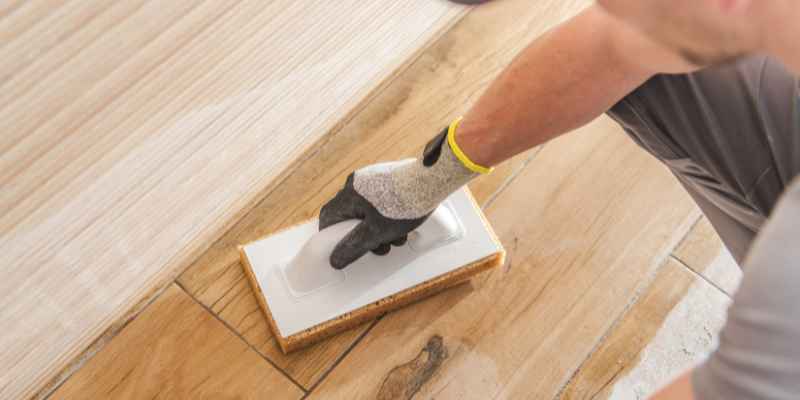
Frequently Asked Questions On Butcher Block Finish Options
What Is The Best Coating For A Butcher Block?
Pure tung oil is the best coating for butcher block. It is food-safe and popular among finishing options. Begin by lightly sanding the surface, then use a lint-free rag to spread a small amount of pure tung oil in circular motions until the entire surface is covered.
What Is The Permanent Finish For Butcher Block?
Pure tung oil is the best coating for a butcher block as it is food-safe. Start by sanding the wood surface. Apply a small amount of oil on a lint-free rag and cover the surface using circular motions. Repeat until the entire surface is covered.
What Do You Finish Butcher Blocks With?
The best coating for a butcher block is pure tung oil. It’s a food-safe option that requires you to sand the surface, pour a small amount of oil onto a lint-free rag, and apply it using circular motions to cover the entire surface.
Should You Polyurethane Butcher Block?
Yes, you can polyurethane butcher block, but it is not recommended because it can be harmful if ingested. The best coating for a butcher block is pure tung oil, which is food-safe and commonly used. Sand the wood surface, apply pure tung oil using a lint-free rag in circular motions, and cover the entire surface.
Conclusion
Choosing the right finish for your butcher block countertops is crucial in ensuring their longevity and maintaining their beauty. With various options available in the market, it can become overwhelming to decide. However, it’s important to keep in mind that factors such as food safety, durability, and ease of maintenance should influence your decision.
Whether you opt for pure tung oil, floor finish or polyurethane, ensure that the finish selected enhances the natural beauty of the wood while providing protection. Remember to follow the recommended maintenance guidelines for your chosen finish to ensure that your butcher block countertops serve you for years to come.
